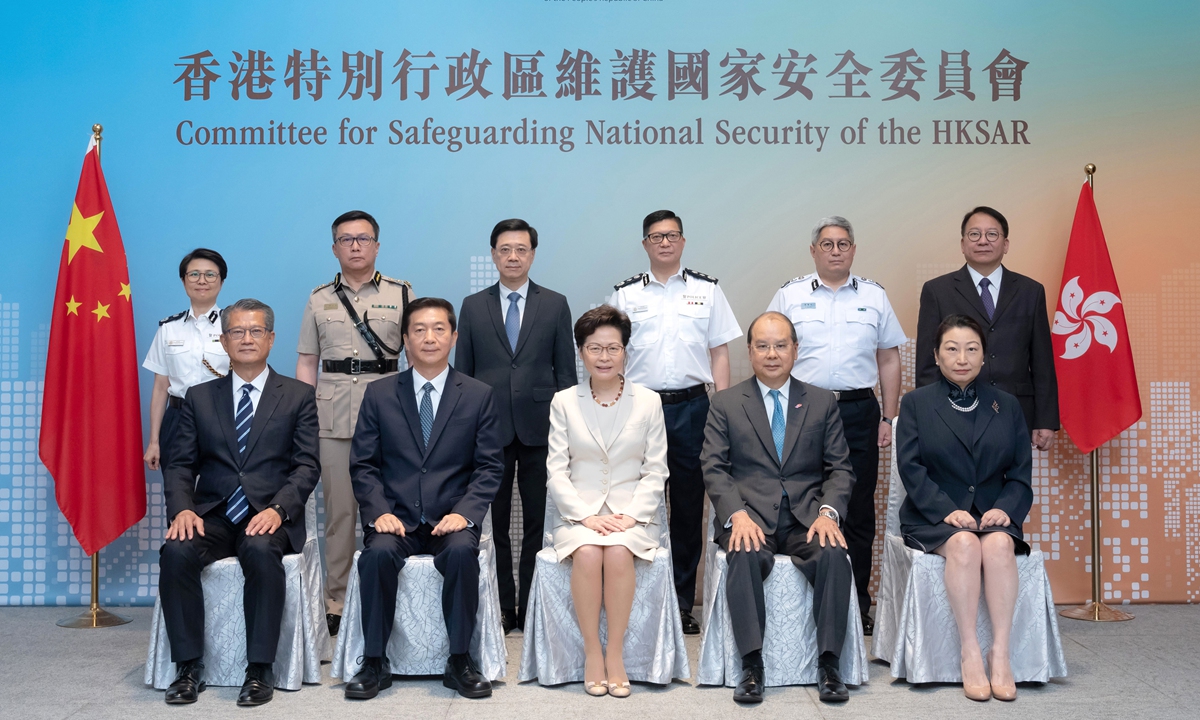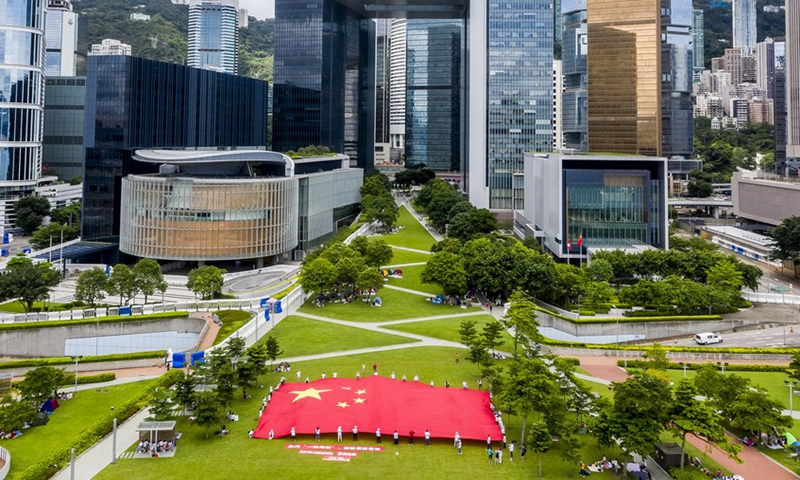Implementing rules further detail enforcement of national security law for HK
By GT staff reporters Source: Globaltimes.cn Published: 2020/7/7 1:24:32

The Committee for Safeguarding National Security of the HKSAR at its first meeting on July 6, 2020 Photo: HKSAR government
The government of the Hong Kong Special Administrative Region (HKSAR) on Monday publicized the implementation rules of an article from the national security law for Hong Kong, which will take effect on Tuesday and further provide legal guarantee for police to apply the law and safeguard the China's national interests, with experts applauding the efficiency and close cooperation between the central government and the HKSAR government.
The seven implementation rules of the 43rd article of the Law of the People's Republic of China on Safeguarding National Security in the Hong Kong Special Administrative Region was made by the newly founded Committee for Safeguarding National Security of the HKSAR at its first meeting on Monday.
"Within several days after the national security law for Hong Kong came into effect, the appointment, formation of organizations and the establishment of the implementation rules show the close cooperation, sufficient plan and accurate preparation between the central government and the Hong Kong government," Tang Fei, a member of the Chinese Association of Hong Kong and Macao Studies, told the Global Times on Monday.
He said that the national security law does not specify all possible situations in law enforcement, but Hong Kong is a society under the rule of law and all law enforcement carried out by police or enforcement departments must have a legal basis, which is the significance of the implementation rules.
The rapidly launched implementation rules show the efficiency of the Hong Kong government, Tian Feilong, a legal expert on Hong Kong affairs at Beihang University in Beijing, told the Global Times on Monday. "It docks the power of the police with existing laws and legal process in Hong Kong."
The implementation rules are a refinement and localization of article 43 of the Basic Law, Tian said.
A spokesperson of the Hong Kong government said on Monday that the purpose (of making the implementation rules) is to ensure that when relevant officers exercise powers and apply measures under article 43 of the national security law, the objectives of preventing, suppressing and imposing punishment for any acts and activities endangering national security can be achieved, while the requirement under the General Principles of the National Security Law to respect and protect human rights, as well as the protection of various rights and freedoms in accordance with the law, can be complied with.
The Implementation Rules have the force of law, noted a report on the news website of the Hong Kong government.
Authorized by the national security law for Hong Kong, Tang said that the implementation rules do not need to be enacted by the Legislative Council, and its legal effect comes from the national security law.
Tang said that the national security law authorized the Chief Executive and Committee for Safeguarding National Security of the HKSAR to formulate the implementation rules, and it can authorize them to amend these laws. The implementation rules will be further improved in the future and the legal framework of the national security law will become clearer, Tang said.
According to the implementation rules, under exceptional circumstances (for instance, in urgent situations), a police officer not below the rank of Assistant Commissioner of Police may authorize his officers to enter the relevant place to search for evidence without a warrant.
The rules also authorize police officers to apply to a magistrate for a warrant to require a person who is suspected to have committed offenses endangering national security to surrender his travel documents, and to restrict that person from leaving Hong Kong, unless some of the people involved in the case flee overseas.
Properties related to criminals endangering national security could be frozen, limited, confiscated or forfeited, according to the rules.
The rules also allow the police the power to remove online messages endangering national security, and to request for assistance, says the fourth rule of the 43rd article of the national security law for Hong Kong.
Tian said that implementation rules have met the reconnaissance needs of national security cases and allowed law enforcement officials to make judgments more flexibly. Otherwise, applying for a warrant may result in precious time being lost, which could result in the loss of evidence.
Tang said this can be said as a new practice - the legal basis is the detailed rules themselves, noting that it is aimed at the secessionists on Telegram and other platforms during the riots last year.
"It will not influence the freedom of speech," Tian said, explaining that the removal of the online information has certain standards, like endangering national security." This sub-article targeted those who hype the violence to promote terrorism and color revolution through the internet, Tian said.
Internet supervision is a common means in national security laws across the world, including the US, and the police have the duty of supervising the internet, Tian noted.
The Commissioner of Police may, with the approval of the Secretary for Security, require a foreign or Taiwan political organization or its agent to provide information on their activities concerning Hong Kong, read the fifth rule.
Tian said that this rule targets the "Taiwan independence" forces that have been permeating in Hong Kong. "The rule could deter them and warn their collusion with the 'Hong Kong independence' forces."
The rules also listed detailed orders on the application for authorization for intercepting communications and covert surveillance, and the requirement to furnish information and produce materials.
"The rules not only ensure the practice of police power in inspection listed by the national security law, but also respect and connect Hong Kong's human rights standard and the legal process during police enforcement," Tian noted.
Both Tian and Tang believed that the rules strengthened the HKSAR's governance in cyber space and gave online platforms the responsibility of assisting law enforcement. Tang stressed that due to Hong Kong's inadequate supervision of network information, these detailed rules may be further supplemented and improved in the future.
Tang said the implementation rules cannot be regarded as expansion of police's power. Apart from the sixth rule, which comes directly from the national security law, most of other rules are seamlessly "transplanted" from Hong Kong's existing laws, which give police law enforcement power. "It is far from expanding and abusing of power," Tang said.
The meeting of the Committee for Safeguarding National Security of the HKSAR on Monday was attended by all members of the committee, led by HKSAR Chief Executive Carrie Lam. National security advisor to Hong Kong appointed by the Chinese central government Luo Huining sat in on the meeting, according to the news website of the Hong Kong government.

Aerial photo taken on June 25, 2020 shows citizens displaying China's national flag in Tamar Park in Hong Kong, South China. Photo: Xinhua
Posted in: HK/MACAO/TAIWAN